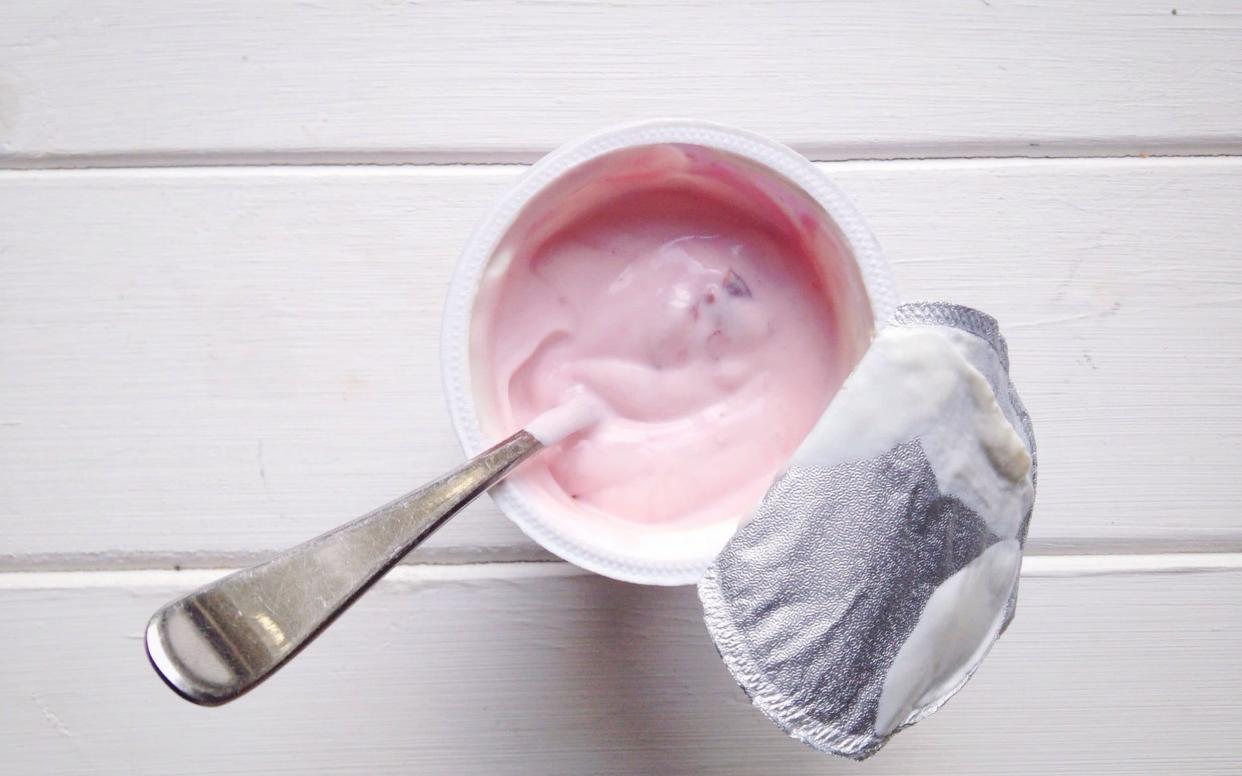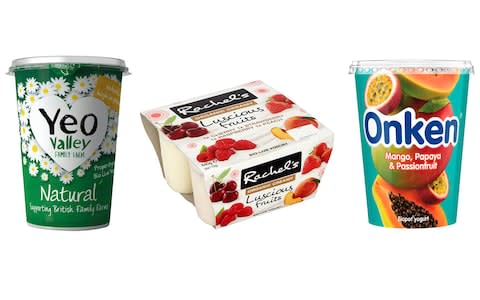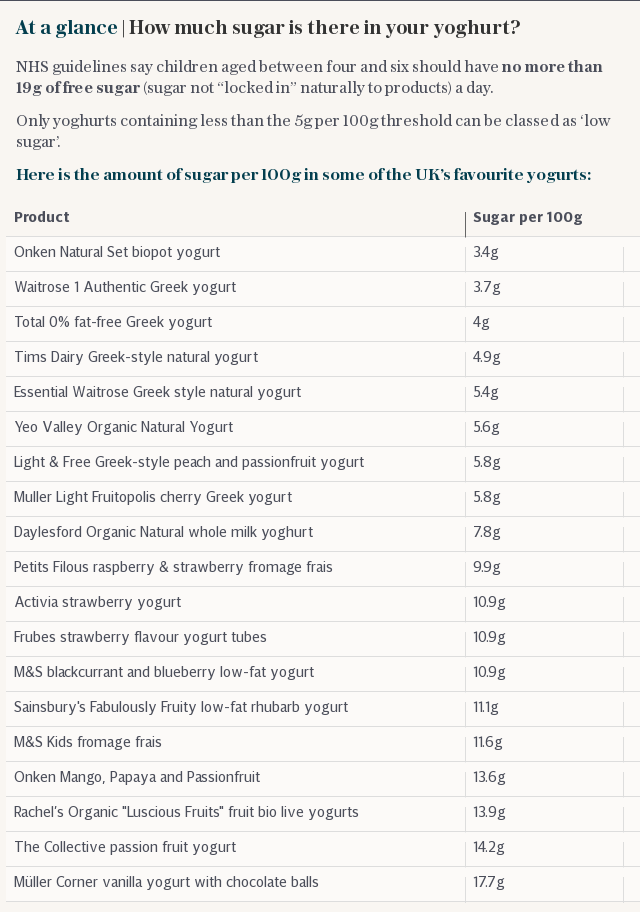The good yogurt guide: how healthy is your daily pot?

Seemingly "healthy" organic and children's yogurts contain the highest amount of sugar, a new study published yesterday in BMJ Open has warned.
Scientists from the University of Leeds and the University of Surrey analysed 921 yogurts available in UK supermarkets, and found that a typical yogurt contains more than half an adult’s daily recommended sugar allowance.
Almost no products marketed at children are low in sugar (some even may contain more sugar than Coca Cola), and apart from dessert-style puds, those labelled as organic contained the most (an average of 13.1g per 100g).
With the exception of natural, Greek and ‘Greek-style’ yogurts, the average sugar levels in yogurt were well above the 5g of sugar per 100g threshold required to be classed ‘low sugar’.
"Items labelled ‘organic’ are often thought of as the ‘healthiest’ option, but they may be an unrecognised source of added sugars in many people’s diets,” said lead author Dr Bernadette Moore, from the School of Food Science and Nutrition at the University of Leeds.
Only two of 101 children’s yogurt and fromage frais products surveyed could be classified as low in sugar
“Many of the products suggested for children’s lunchboxes were high sugar," she added. The NHS recommends that four to six-year-olds should have no more than 19 grams of sugar a day.
Only two of 101 children’s yogurt and fromage frais products surveyed could be classified as low in sugar, with the majority having an average of 10.8 grams per 100 grams.
A single pot of yogurt can contain the entirety of a child's daily sugar allowance, health officials have warned previously, and a number of major brands have been found by Public Health Liverpool to contain the equivalent of almost five sugar cubes.
At a time when obesity is on the rise, rotting teeth cost 60,000 school days a year and the Soft Drinks Industry Levy (also known as the sugar tax) is whipping Britain's drinks industry into shape, should we all be just as wary about the amount of yogurt we're consuming as we are fizzy drinks and chocolate bars?
The new study highlights the mixed messages that come from the marketing of yogurt products, so it pays to be sleuth-like in the supermarket aisle. But should you strike it off the shopping list completely - and if not, how can you tell deceptively high sugar yogurt from low sugar yogurt?

Yogurt itself is a nutritional powerhouse as part of a balanced diet, so there's no need to cut it out: according to the study co-author Dr Barbara Fielding, from the University of Surrey, yogurt can be a great source of protein, calcium, iodine and vitamin B12.
Fermented dairy products have long been considered to be beneficial to digestive health, and yogurt has even been associated with lower risk of obesity and cardiometabolic risk in both children and adults.
Natural, ‘plain’ and Greek-style yogurts were found to have a dramatically different nutrient profile from all other categories, containing much higher levels of protein, lower carbohydrates level and the least amount of sugar, with the average of five grams per 100g, largely made up of naturally-occurring lactose.
It could be wise to stick to these. According to registered nutritionist Clarissa Lenherr, it's not yogurt itself that's the problem, but what's added to it. "Avoid any yogurt that claims to taste like a dessert, especially one that says it is fat-free but that it tastes like banoffee pie," she says. "The reason these yogurts taste 'good' is that they have been packed full of sugars and/or sweeteners to replace the fats that have been stripped from them.

"Commercial yogurts tend to be pumped with sugar and fruit purées to make them taste more like a dessert and less like a breakfast staple. By adding sugars to the mix, you are potentially causing your blood sugar levels to rise, which will start your day on a blood sugar rollercoaster, leading to less energy, more cravings and of course, hunger."
Lenherr says you should look for yogurts that contain 4-6g of sugar per 100g serving, as this is roughly the amount of natural sugars that are present in dairy products. Anything over that is most likely added 'free' sugar. "The best option is to choose plain, unsweetened, whole fat yogurt and top with fresh fruit," she adds.
The nutritionist says we should be wary of yogurts purporting to be flavoured with 'real fruit': "This often comes from concentrated fruit sources which still represent a significant amount of sugar. Watch out for the other names for sugar such as dextrose, maltose, and barley malt, to name a few.
Pure yogurt is supposed to have two ingredients: organic milk and live cultures
"Most commercial yogurts are also packed with additives such as stabilisers, colour and artificial flavouring. Avoid products that have ingredients you can’t read or recognise. The less, the better.
"Pure yogurt is supposed to have two ingredients: organic milk and live cultures."
The good news is that yogurt in its most simple form can be good for you: "Yogurt can be a fantastic addition to a healthy and well-balanced diet, as long as you choose the right kind, and don’t suffer from an allergy, intolerance or condition that might be worsened by consuming dairy. It's a great choice for breakfast, as it offers a source of protein, fats and vitamins.
"Yogurt with live cultures offers us a rich source of probiotics, which are crucial for our gut health, and strengthen our digestive system and gut flora by providing good bacteria to help populate the gut. This supports digestion, immune system health and the creation of certain essential vitamins, such as Vitamin B12, that we need for balanced bodily function."
But it's these "good for your gut" live cultures which produce a natural sourness - which might be why sugar is so often over-used as a sweetener.
"Children are more likely to crave added flavour when it comes to yogurt, but adding fresh fruit or pure honey yourself is the best way to flavour it," suggests Lenherr. "In many Middle Eastern countries, full-fat yoghurt is eaten with olive oil, herbs and seasoning, which is a great healthy option for those without a sweet tooth."

What about full fat versus low fat? "The fat in dairy products is what makes them satiating, and by stripping dairy products of their fat, you are also reducing the amount of Vitamin A and D that they contain. Both are crucial vitamins and both are fat-soluble, which means that they need fat to be absorbed.
"So, even when you choose low-fat dairy products that have been fortified with these vitamins, you may not even be absorbing them, due to the fact that the product has little fat left in it.

"Studies suggest that those who regularly consume high-fat dairy products are likely to experience a higher level of weight loss, than those who opt for lower fat dairy or dairy alternatives such as margarine."
Despite the worrying amount of sugars added to some yogurts, Lenherr stresses that there are naturally occurring sugars in yogurt, which aren't so much of a concern. "Don’t take every gram on the label to heart," she urges. "Dairy products have naturally occurring sugars in them, so even some plain unsweetened yogurts will still have an amount of sugar in their nutritional breakdown."
This piece was originally published in 2017 and has been updated and republished to include new research out this week.

 Yahoo News
Yahoo News 
